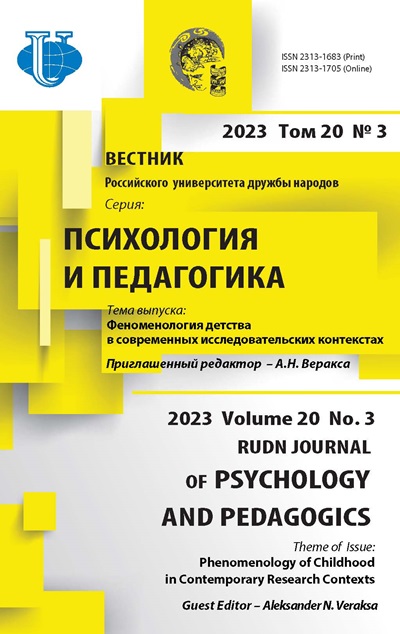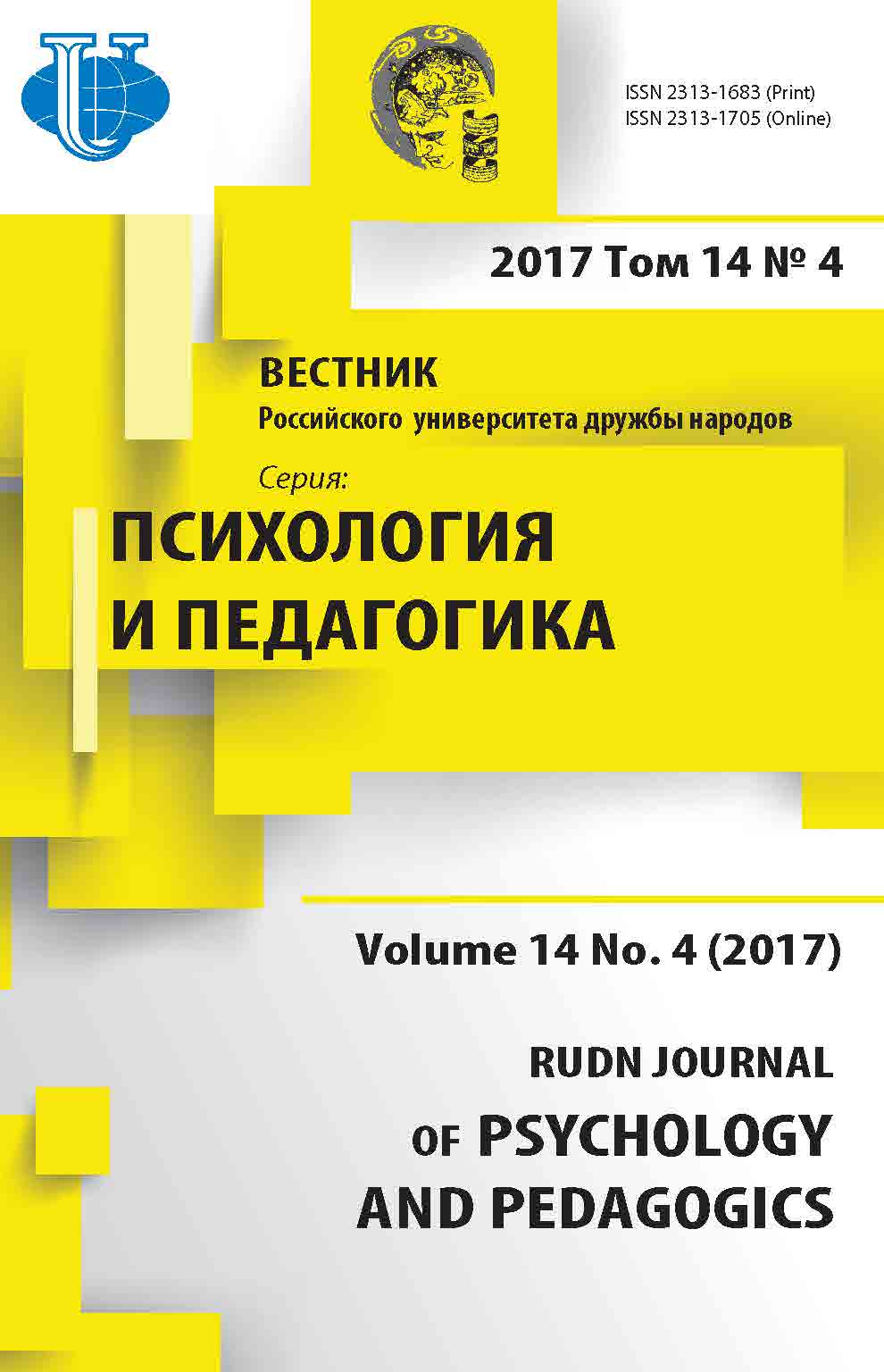PREDICTORS OF SOCIAL AND PSYCHOLOGICAL ADAPTATION OF THE UNEMPLOYED AND PEOPLE WITH REGULAR EMPLOYMENT
- Authors: Shamionov R.M1, Yeremina E.N1
-
Affiliations:
- Saratov State University
- Issue: Vol 14, No 4 (2017)
- Pages: 383-399
- Section: Articles
- URL: https://journals.rudn.ru/psychology-pedagogics/article/view/17254
- DOI: https://doi.org/10.22363/2313-1683-2017-14-4-383-399
Cite item
Full Text
Abstract
The article discusses the results of a study on the socio-psychological adaptation predictors of the unemployed in relation to people with regular employment. It is assumed that adaptation of the employed and the unemployed is determined by various socio-psychological phenomena; definition of the phenomena will allow to develop programmes of adaptation for the unemployed with preservation of motivation for self-realization. In total, 362 people (33% of whom were male) took part in the study, including 196 unemployed. Standardized methods and scales developed by the authors for assessing the subject position characteristics and adaptive readiness of a person were used. It was found that the unemployed are characterized by lower indicators of socio-psychological adaptation and characteristics that are of paramount importance for adaptation - self-acceptance, acceptance of others, emotional comfort. Socio-demographic characteristics, scales of subjective position, adaptive readiness, subjective well-being and values were consistently introduced to the regression equation. It is shown that adaptive readiness and values are the strongest predictors for the employed, while indicators of subjective well-being and value are more significant for the unemployed. The general predictors of adaptation are the level of education, happiness (positively) and negative affect (negatively). In other cases, the predictors are strictly differentiated.
About the authors
Rail M Shamionov
Saratov State University
Author for correspondence.
Email: shamionov@mail.ru
Rail M. Shamionov - Dr. Sci. (Psychology), Professor, Head of the Chair of Social Educational and Developmental Psychology at Saratov State University (Saratov, Russia).
Astrakhanskaya str., 83, Saratov, Russia, 410012Elena N Yeremina
Saratov State University
Email: ereminae@mail.ru
Elena N. Eremina - Postgraduate student of the Chair of Social Educational and Developmental Psychology at Saratov State University (Saratov, Russia).
Astrakhanskaya str., 83, Saratov, Russia, 410012References
- Akimenko, A.K. (2010). The Interrelationship of Representations about a Lie and the Strategy of Behaviour of Modern Youth During Social-Psychological Adaptation. Izvestiya of Saratov University. New Series. Series: Philosophy, Psychology, Pedagogy. Developmental Psychology, 10(3), 56—61. (In Russ.).
- Akimenko, A.K. (2014). Strategies of Adaptation Behavior of Students Youth and Their Characteristic. Izvestiya of Saratov University. New Series. Series: Educational Acmeology. Developmental Psychology, 3(1), 63—74. (In Russ.).
- Arendachuk, I.V. (2015). Personal Potential and Socio-Psychological Adaptation as a Resource of Psychological Readiness to Take Risks. Izvestiya of Saratov University. New Series. Series: Educational Acmeology. Developmental Psychology, 4(3), 219—226. (In Russ.).
- Aysina, R.M. (2016). Career downshifting as a strategy for coping with job loss. Vestnik MGOU seriya Psikhologicheskiie nauki, (4), 31—40. (In Russ.).
- Balakshina, E.V., Gefele, O.F., & Yulaeva, V.A. (2013). Study of Stress Resistance and Level of Socio-Psychological Adaptation of the Unemployed. Science Prospects, 3(42), 11—14.
- Bocharova, E.E. (2015). Adaptation Readiness of Personality to Situations of Social Changes. Izvestiya of Saratov University. New Series. Series: Educational Acmeology. Developmental Psychology, 4(1), 45—51. (In Russ.).
- Chumakov, M.V. (2015). Subjective Well-Being and Emotional-Volitional Sphere of the Personality. Vestnik Kurganskogo gosudarstvennogo universiteta. Serija: Fiziologija, psihologija i medicina, 2(36), 96—100. (In Russ.)
- Diomin, A.N. (2006). Psychological mechanisms of personality behavior under the unemployment conditions. Psikhologicheskii journal, 27(2), p. 31—43. (In Russ.)
- Dzhidaryan, I.A. (2013). Psihologija schast’ja i optimizma. Moscow: Institute of Psychology RAS Publ. (In Russ.).
- Grigorev, A.V. (2014). Personal Qualities and Characteristics of the Relationship to the Activity as Predictors of Social and Psychological Adaptation of the Person, Depending on the Focus of the Activity Implemented. Modern problems of science and education, (5), 630.
- Grigoreva, M.V. (2014). Concept Apparatus in Psychology of Personality’s Adaptation. Izvestiya of Saratov University. New Series. Series: Educational Acmeolog y. Developmental Psychology, 3(3), 259—263. (In Russ.).
- Hamzyaeva, O.S. (2014). Valuable Orietations of Students Polyethylene Conical Region as a Social and Psychological Adaptation. Primo Aspectu, 19(24), 122—125. (In Russ.).
- Kornilova, T.V. (2013). Rigidity, Tolerance for Uncertainty and Creativity in the System of Intellectual and Personality Potential. Moscow University Psychology Bulletin, (4), 36—47.
- Leonov, I.N. (2015). Influence of Tolerance towards Uncertainty on the Strategy of Coping Behavior in Managers. Izvestiya of Saratov University. New Series. Series: Educational Acmeology. Developmental Psychology, 4(3), 259—261. (In Russ.).
- Loginova, E.I. (2009). Value Orientation as a Factor of First-year Students’ Psychosocial and Neuro-Psychic Adaptation to Study Conditions. Vestnik of Saint-Petersburg State University. Series 12. Sociology, (3-2), 107—111. (In Russ.).
- Lomov, B.F. (1984). Metodologicheskie i teoreticheskie problemy psihologii. Moscow: Nauka. (In Russ.).
- Mironova, T.L., & Sanzhizhapova, N.D. (2011). Socially-Psychological Features of Adaptation of Jobless Women. Psychology in Economics and Management, (1), 36—41. (In Russ.).
- Nalchadjian, A.A. (2010). Psychological adaptation. Moscow: Eksmo. (In Russ.).
- Osin, E.N. (2012). Measuring Positive and Negative Affect: Development of a Russian-language Analogue of PANAS. Psychology. Journal of the Higher School of Economics, 9(4), 91—110. (In Russ.).
- Osin, E.N., & Leontiev, D.A. (2008). Approbation of Russian-language versions of two scales of rapid assessment of subjective well-being. Proceedings of the III All-Russian Sociological Congress. Moscow: Institute of Sociology, Russian Academy of Sciences, Russian Society of Sociologists. Available at: http://www.isras.ru/abstract_bank/1210190841.pdf (Accessed 30 March 2016). (In Russ.).
- Osnitsky, A.K. (2004). Determination of the Characteristics of Social Adaptation. Psihologija i Shkola, 1, 43—56. (In Russ.)
- Ovcharova, E.V. (2012). Psychological Peculiarities of Unemployed and their Correlation with Unemployment Term. Vestnik YarGU. Seriya Gumanitarnye nauki, (4), 103—106. (In Russ.).
- Petrash, E.A., & Nikishina, V.B. (2008). Internal and External Motivation in the Determination of Social and Psychological Adaptation of the Unemployed Person. Siberian Pedagogical Journal, (15), 369—378. (In Russ.).
- Petrovsky, A.V. (1984). The Problem of Personality Development from the Standpoint of Social Psychology. Voprosy Psychologii, (4), 15—29. (In Russ.).
- Pilishvili, T.S., & Ismaeel, A.M. (2016). Proactive Coping as a Personal Potential Resource in the Process of Adaptation to New Life Conditions. RUDN Journal of Psychology and Pedagogics, (2), 75—83. (In Russ.).
- Shamionov, R.M. (2015). Adaptation Readiness of the Personality as a Subject of Social Interaction. Izvestiya of Saratov University. New Series. Series: Philosophy. Psychology. Pedagogy, 15(4), 106—112. (In Russ.).
- Sheptura, A.V., & Krupnov, A.I. (2014). Ratio of Confidence and Adaptability of Chinese Students. RUDN Journal of Psychology and Pedagogics, (2), 24—28. (In Russ.).
- Shvarts, S.H., Butenko, T.P., Sedova, D.S., & Lipatova, A.S. (2012). Theory of Basic Personal Values: Validation in Russia. Psychology. Journal of the Higher School of Economics, 9(1), 43—70. (In Russ.).
- Vagapova, A.R. (2011). Ecopsychological Characteristics of the First-Year Students Adaptation Process to the Educational Environment of University. Izvestiya of Saratov University. New Series. Series: Educational Acmeology. Developmental Psychology, (2), 37—41. (In Russ.).
- Vagapova, A.R., & Es’kina, E.S. (2016). Adaptive Readiness of Secondary School Students. Izvestiya of Saratov University. New Series. Series: Educational Acmeology. Developmental Psychology, 5(4), 350—355. (In Russ.).
- Zhuravleva, N.A. (2009). Dynamics of the Value Orientations of the Individual in the Conditions of Macrosocial Changes. In: A.L. Zhuravlev, & A.V. Yurevich (Eds.), Macropsychology of Modern Russian Society (pp. 207—253). Moscow: Institute of Psychology RAS Publ. (In Russ.).
















